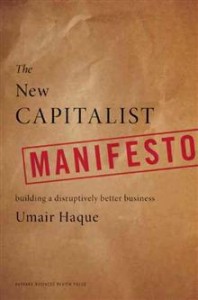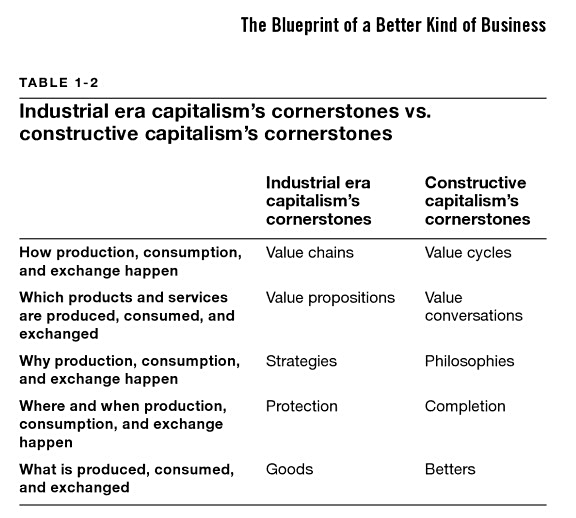 Sustainable Business Strategy
Sustainable Business Strategy
We all know “sustainability” is a good idea. Recycle, save the environment, give back–all good stuff. And if a business is going this on the side, we like that, too. We may even volunteer a few hours to participate, or at least donate a Facebook like and Tweet about it all.
The New Capitalist Manifesto is a book that carefully brings together two seemingly paradoxical concepts: The pursuit of successful business, and the practice of resource responsibility. In the examples I’ve given before, these two things occur on different parallels. Business is in the business of making money, and environmental activities are a distinctly different activity.
The New Capitalist Manifesto shows that the two aren’t necessarily opposing. In fact, for those creative, pioneering companies of the world, those that the book coins “insurgents,” the practice of earning a profit and reducing its business costs to the environment can be simultaneous. These “constructive capitalists” have figured out how to replace the emphasis on competitive advantage with an imperative for constructive advantage.

The Real Cost of Doing Business
 Let’s take a step back just to level-set. At the back-bone of all this is the reality that a $3 burger with a book cost-of-goods-sold value of $2, in fact, costs more to produce. In twentieth-century business, profits derive from the practice of shifting costs to and / or borrowing benefits from people, the environment, future generations, and society as a whole. As the book discusses, the actual cost, or “authentic economic cost” of the $3 burger is closer to $30, and includes environmental and health care costs, and even government subsidies.
Let’s take a step back just to level-set. At the back-bone of all this is the reality that a $3 burger with a book cost-of-goods-sold value of $2, in fact, costs more to produce. In twentieth-century business, profits derive from the practice of shifting costs to and / or borrowing benefits from people, the environment, future generations, and society as a whole. As the book discusses, the actual cost, or “authentic economic cost” of the $3 burger is closer to $30, and includes environmental and health care costs, and even government subsidies.
Were the government, the book reveals, no longer giving today’s water subsidy to Great Plains states, the price for a pound of beef would be $35. All these factors are benefits “borrowed” from society as a whole, and are essential measurements for what businesses need to account to do constructive business. Both cost shifting and benefit borrowing are traditional business norms that are unfair, nonconsensual, and often irreversible forms of economic harm.
Principles of Constructive Capitalism
The book identifies five cornerstones to the new, constructive capitalistic approach:
- Loss advantage: From value chains to value cycles
- Responsiveness: From value propositions to value conversations
- Resilience: From strategy to philosophy
- Creativity: From protecting a marketplace to completing a marketplace
- Difference: From goods to betters
 This twenty-first-century constructive capitalism is founded on smart growth, constructive advantage, and thick value, which brings about rebalance to existing imbalance. As Manifesto examines, constructive capitalists “minimize harm and maximize authentic, sustainable, meaningful value”. And these new capitalists aren’t just a hodgepodge of airy-fairy extremists, either. Walmart, Nike, Google, Unilever, Tata, and a host of other companies are proven case studies of this approach.
This twenty-first-century constructive capitalism is founded on smart growth, constructive advantage, and thick value, which brings about rebalance to existing imbalance. As Manifesto examines, constructive capitalists “minimize harm and maximize authentic, sustainable, meaningful value”. And these new capitalists aren’t just a hodgepodge of airy-fairy extremists, either. Walmart, Nike, Google, Unilever, Tata, and a host of other companies are proven case studies of this approach.
Beyond all these arguments, this new economy the book speaks of, and new accounting system will happen whether we like it or not. There is little we can do to avoid it because it’s a matter of survival. The same capitalist tenants that say “only the strong survive will eventually mandate that those who adhere to the new practices of resource responsibility will survive.
The bottom line is this: The wrong kind of growth inhibits our quality of life. As The New Capitalist Manifesto states, “Most businesses are still serving up the economic equivalent of fast food: negative-impact goods and services that fail to make people, communities, and society tangibly better off.”

![Constructive Capitalism and the New Capitalist Manifesto [Book Review] 14378429](https://www.socialmarketingfella.com/wp-content/uploads/2012/04/14378429-1000x600.jpg)

![Constructive Capitalism and the New Capitalist Manifesto [Book Review] PlanetUp earthday socialmarketingfella1](https://www.socialmarketingfella.com/wp-content/uploads/2012/04/PlanetUp-earthday-socialmarketingfella1-150x150.jpg)
![Constructive Capitalism and the New Capitalist Manifesto [Book Review] Igloo collaboration socialmarketingfella](https://www.socialmarketingfella.com/wp-content/uploads/2012/04/Igloo-collaboration-socialmarketingfella-150x150.jpg)